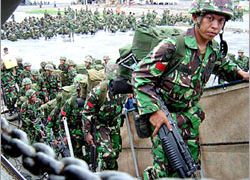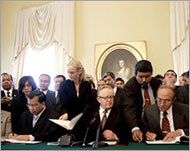Indonesia troops begin Aceh pullout
Indonesian rebels and government troops in Aceh have met for the first time since their 15 August peace deal, as 1300 Indonesian soldiers withdrew from the province.

Monday’s troop withdrawal was the first step by Indonesia in implementing the landmark peace deal.
Two battalions from the army’s Kostrad strategic reserve – about 1300 men – left on board a navy ship from Krueng Guekueh port in North Aceh early on Monday, military deputy spokesman Ahmad Yani Basuki said.
Monday’s meeting, which the Indonesian government described as positive, was attended by European and Southeast Asian peace monitors.
“I can report to you that the atmosphere of the first meeting was excellent,” said Pieter Feith, chief of the Aceh Monitoring Mission.
“Both parties have reaffirmed their commitment to the implementation of the MoU,” he said referring to the memorandum of understanding signed in Finland on 15 August, ending nearly three decades of fighting.
Tsunami effect
The peace deal was spurred by Aceh’s widespread destruction by the 26 December Asian tsunami which left about 170,000 Acehnese killed or missing.
|
“I can report to you that the atmosphere of the first meeting was excellent” Pieter Feith, chief, |
Indonesia and rebels from the Free Aceh Movement (GAM) signed a peace pact in Helsinki on 15 August, agreeing to end hostilities after a 29-year conflict which left nearly 15,000 dead, most of them civilians.
Indonesia’s Information Minister, Sofyan Djalil, was similarly optimistic after the meeting, which was also attended by a senior GAM official and the province’s military and police chiefs.
“The result of this meeting is very positive,” he said, without giving details.
The monitoring mission has wide-ranging tasks in seeing that both parties keep the truce. For example, the Indonesian military must notify Feith of any troop movements above a platoon size.
Monitor’s role
The mission objective is to monitor GAM’s disarmament and the full withdrawal of government soldiers from the province.
The monitors will also rule on disputed amnesty cases, complaints, and alleged violations of the truce.
Under the accord, GAM dropped its long-held demand for independence for a form of local self-government, and agreed to disarm and demobilise its 3000 fighters.
Indonesia promised to withdraw its non-local security forces by the end of the year, offer amnesties to rebels and allow the creation of political parties in the province.
About 14,000 military and 7000 police are expected to remain in Aceh after the pullout is completed. GAM complained shortly after the pact was signed that the figure was too high.
The rebels have also alleged that 10,000 militiamen linked to the military were active in Aceh and had threatened to kill rebels after they disarmed under the pact.
Indonesia’s commitments
Jakarta has in response pledged to protect the rebels.
 |
|
Breakthrough peace talks led to |
The departing troops were given a farewell ceremony attended by Aceh’s military commander and a member of the Initial Monitoring Presence (IMP), a precursor of the international Aceh Monitoring Mission, Basuki said.
The mission will eventually comprise at least 200 unarmed monitors from the European Union and Southeast Asia, who will oversee the implementation of the pact.
Their work officially begins on 15 September.
Amnesty
Justice Minister Hamid Awaluddin announced that more than 90% of nearly 1500 rebels detained on politically-related charges would be eligible for an amnesty to be announced later this month.
“I stress that those to be given amnesty are political activists who had been sentenced for subversion or faced subversion charges,” he said.
“The number of people jailed for subversion is much larger [than for criminal offences]. More than 90%,” he added.
A total of 1472 GAM prisoners were currently in jail, he said. About 450 other rebels were freed last week to mark Indonesia’s independence day.
The government is to meet a parliamentary commission on Wednesday to explain the amnesty, which must be put in place by 31 August.
The commission will then offer details to parliament, which cannot block the amnesties but must be consulted.